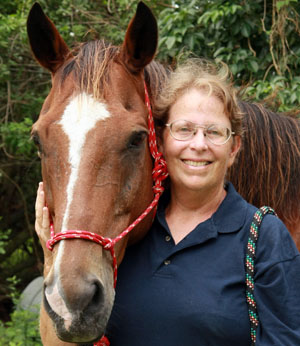TAILS FROM THE TRAILS
No one thinks much about stomachs until there’s a pain, and then that’s all you can think about. It’s true about people, and it’s true about horses. I never thought about horses having ulcers at all, ever, and then suddenly, they were all around me.
I ran into someone who owned a horse I’d raised and heard he (the horse, not the new owner) now had ulcers that were being treated. One of my current horses seemed to have an ulcer as well. Just to round things out, even I had weird stomach pains and had to have an endoscopy. Happily, no ulcer, but still… what was going on?
“In a word, ulcers in horses are caused by stress and more stress,” said Dr. Scott Swerdlin of Palm Beach Equine in Wellington. “And stress can come in many forms. It can be the result of competition, or preparing for competition. Ulcers are common in race horses, polo ponies, dressage horses and jumpers.”
It is more typical in horses who are fed a high-grain diet, less roughage and kept in a stall for most of the day. “In other words, things horses wouldn’t normally do,” Swerdlin said. “Ulcers are an example of a disease caused by what we’ve done to horses.
Any horse can get an ulcer, and there’s a much higher incidence of ulcers than most people suspect.
“As many as 80 percent of horses may have some degree of gastritis, stomach inflammation or ulcers,” Swerdlin said.
“We see ulcers in horses you wouldn’t think of as being in a stressful situation,” added Dr. Jordan Lewis, also of Palm Beach Equine. “Any abrupt change in a horse’s daily routine can bring on an acute attack pretty quickly. We see it in so-called ‘weekend warriors’ who ignore their horses during the week, then jump on and ride them hard over a weekend.”
Shipping a horse can also be very stressful, or changing barns.
“The signs can be mild, such as grinding their teeth, especially in foals, and what’s called ‘grazers,’ which are horses who take a bite of grain then walk around a bit, then take another bite,” Lewis said. “Some horses are ‘dunkers,’ who dunk their hay in water before eating it to make it softer. They may look worried or go off their feed. Nervous horses, spooky horses, horses who colic repeatedly, have poor coats, poor body condition and who don’t perform well — all of them should be checked for ulcers.”
The only sure way to diagnose an ulcer is to have the horse tubed. During a gastroscopy, the horse is lightly sedated and an endoscope is passed through the nose into the stomach. The results can vary from Grade 0, which is normal, through Grade 4, with extensive lesions and areas of deep ulceration.
“Bute and Banamine not only don’t help, they can irritate and exacerbate ulcers,” Lewis said. “The best thing to do is have your vet examine the horse to determine the exact problem. The vet may recommend a medication such as GastroGuard, which is the only FDA-approved product that will cure a horse’s ulcers during a 28-day treatment period. Using other products may make the situation worse by causing the stomach acid to rebound.”
There are other changes a horse owner can make: feeding good quantities of a soft grass hay, reducing sweet feeds or high-carb, high-sugar feeds, keeping to a less-stressful routine a horse understands and accepts, and giving a horse adequate turn-out time.
If you suspect your horse may have gastritis or possibly an ulcer, you should check with your vet. If you’re also into alternative medicine, you can palpate the horse to check for certain reactions that tend to point toward a stomach problem. Dr. Mark DePaolo has posted a video on YouTube illustrating the pressure points and various reactions from different horses. Watch it at www.youtube.com/watch?v=Fr05hMmLCY4.
A friend of mine who knew about this holistic approach tried it on my mare, and she did, in fact, react in a way that indicated ulcers. She was a nervous type, and had recently joined my herd after a life of being moved frequently and losing a pasture mate. A good diet, light work, plenty of turn-out time with other relaxed horses and a steady routine helped her feel much better.
“Ulcers are one disease people try to treat by themselves,” Swerdlin said. “And they can get into a lot of trouble. Horses have a lot of moving parts. You have to look at the whole picture.”








